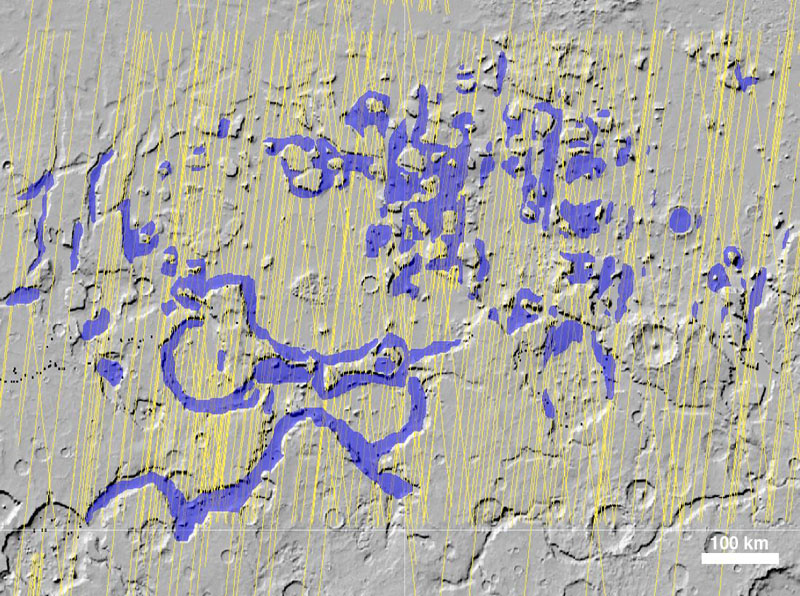Hidden Glaciers Are Common on Mars

Vastglaciers of ice are common on Mars, but you have to dig below the surface tofind them, new radar views from a NASA spacecraft show.
Thesehidden deposits of buried Martianice were first confirmed two years ago, but recent scans of the red planetby NASA's Mars Reconnaissance Orbiter are revealing new clues about how the icemay have gotten there.
Scientiststhink the Marsglaciers may have been left as remnants when regional ice sheets retreated.
"Thehypothesis is the whole area was covered with an ice sheet during a differentclimate period, and when the climate dried out, these deposits remained onlywhere they had been covered by a layer of debris protecting the ice from theatmosphere," said Jeffrey Plaut of NASA's Jet Propulsion Laboratory inPasadena, Calif.
Theice extends for hundreds of miles, or kilometers, in a mid-latitude region ofMars called Deuteronilus Mensae.
Plautand colleagues recently used the spacecraft's Shallow Radar instrument toassemble a map of the Mars ice from more than 250 observations of an area aboutthe size of California.
"Wehave mapped the whole area with a high density of coverage," Plaut said."These are not isolated features. In this area, the radar is detectingthick subsurface ice in many locations."
Get the Space.com Newsletter
Breaking space news, the latest updates on rocket launches, skywatching events and more!
Theresearchers presented the map at this week's 41st Lunar and Planetary ScienceConference near Houston.
Futurestudies of this buried ice could reveal more about the environmental conditionsat the time it was deposited. The glaciers could be a promising target for a futuremission to Mars, the scientists said.
TheMarsReconnaissance Orbiter is NASA's most powerful spacecraft currently inorbit around Mars.
Theprobe launched in 2005 and arrived at the red planet in March 2006. To date,the orbiter has beamed more than 100 terabits of data and photographs to Earth.That's more data on Mars than that collected by all other missions to redplanet combined.
- Images - Ice on Mars
- Tons of Water Ice Found on the Moon's North Pole
- SPACE.com Video Show: What Went Wrong on Mars?
Join our Space Forums to keep talking space on the latest missions, night sky and more! And if you have a news tip, correction or comment, let us know at: community@space.com.

Clara Moskowitz is a science and space writer who joined the Space.com team in 2008 and served as Assistant Managing Editor from 2011 to 2013. Clara has a bachelor's degree in astronomy and physics from Wesleyan University, and a graduate certificate in science writing from the University of California, Santa Cruz. She covers everything from astronomy to human spaceflight and once aced a NASTAR suborbital spaceflight training program for space missions. Clara is currently Associate Editor of Scientific American. To see her latest project is, follow Clara on Twitter.









